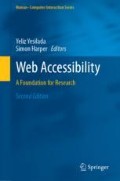Abstract
This chapter introduces inclusive writing and how to incorporate it into research. We give general guidelines on language choice and suggestions on writing for and about specific user groups. However, language is constantly evolving. Preferred language for writing about people with disabilities changes over time, and with context, and can be a source of disagreement even within a user group. The inclusive writing approach proposed here covers three key points: use the included terminology and considerations as a starting point; verify language choices and other assumptions through feedback with participants; and strive for respect in all research interactions. The chapter also explores how careful thinking about language can make an entire research project more accessible and inclusive.
Access this chapter
Tax calculation will be finalised at checkout
Purchases are for personal use only
References
Cavender A, Trewin S, Hanson VL (2008) General writing guidelines for technology and people with disabilities. SIGACCESS Access Comput 92:17–22. https://doi.org/10.1145/1452562.1452565
Dunn DS, Andrews E (2015) Person-first and identity-first language: developing psychologists’ cultural competence using disability language. Am Psychol 70:255–264
Foreman P (2005) Language and disability. J Intellect Dev Disabil 30(1):57–59
Gernsbacher MA et al (2016) Special needs’ is an ineffective euphemism. Cogn Res Princ Implic 1:29 (PMC. Web. 22 June 2018)
Hanson VL, Cavender A, Trewin S (2015) Writing about accessibility. Interactions 22(6):62–65
Hehir T, Grindal T, Freeman B, Lamoreau R, Borquaye Y, Burke S (2016) A summary of the evidence on inclusive education. ABT Associates https://alana.org.br/wp-content/uploads/2016/12/A_Summary_of_the_evidence_on_inclusive_education.pdf. Accessed 1 July 2018
Kenny L, Hattersley C, Molins B, Buckley C, Povey C, Pellicano E (2016) Which terms should be used to describe autism? Perspectives from the UK autism community. Autism 20(4):442–462. The National Autistic Society
Kirkpatrick A, O’Connor J, Cooper M (2018) Web content accessibility guidelines (WCAG) 2.1. W3C Recommendation 5 June 2018. https://www.w3.org/TR/WCAG21/. Accessed 1 July 2018
Lazar J, Feng JH, Hochheiser H (2017) Research methods in human-computer interaction, 2nd edn. Morgan Kaufmann, Cambridge
Loftus E, Palmer J (1974) Reconstruction of automobile destruction: an example of the interaction between language and memory. J Verbal Learn Verbal Behav 13:585–589
National Center on Disability and Journalism (2018) Disability language style guide. http://ncdj.org/style-guide/. Accessed 2 July 2018
Seeman L, Cooper M (2015) Cognitive accessibility user research. W3C First Public Working Draft 15 January 2015 https://www.w3.org/TR/coga-userresearch/. Accessed 1 July 2018
Sears A, Hanson VL (2011) Representing users in accessibility research. In: Proceedings of the SIGCHI conference on human factors in computing systems (CHI ‘11). ACM, New York, NY, USA, pp 2235–2238. https://doi.org/10.1145/1978942.1979268
Smith M, Sharit J, Czaja S (1999) Aging, motor control, and the performance of computer mouse tasks. Hum Factors 41(3):389–396. https://doi.org/10.1518/001872099779611102
Trewin S, Richards JT, Hanson VL, Sloan D, John BE, Swart C, Thomas JC (2012) Understanding the role of age and fluid intelligence in information search. In: Proceedings of the 14th international ACM SIGACCESS conference on computers and accessibility (ASSETS ‘12). ACM, New York, NY, USA, pp 119–126. https://doi.org/10.1145/2384916.2384938
UN General Assembly (2007) Convention on the rights of persons with disabilities: resolution/adopted by the General Assembly, 24 Jan 2007, A/RES/61/106. Available at http://www.refworld.org/docid/45f973632.html. Accessed 3 July 2018
United Nations, Department of Economic and Social Affairs, Population Division (2015) World population ageing 2015 (ST/ESA/SER.A/390)
US Census Bureau (2016) 2016 American community survey 1-year estimates. https://factfinder.census.gov/bkmk/table/1.0/en/ACS/16_1YR/S181. Accessed 31 Aug 2018
White K, Abou-Zahra S, Henry SL (2016) Tips for getting started writing for web accessibility. Available at https://www.w3.org/WAI/tips/writing/. Accessed 31 Aug 2018
Yesilada Y, Brajnik G, Vigo M, Harper, S (2012) Understanding web accessibility and its drivers. In: Proceedings of the international cross-disciplinary conference on web accessibility (W4A ‘12). ACM, New York, NY, USA, Article 19, 9 pp. https://doi.org/10.1145/2207016.2207027
Author information
Authors and Affiliations
Corresponding author
Editor information
Editors and Affiliations
Rights and permissions
Copyright information
© 2019 Springer-Verlag London Ltd., part of Springer Nature
About this chapter
Cite this chapter
Babinszki, T. et al. (2019). Inclusive Writing. In: Yesilada, Y., Harper, S. (eds) Web Accessibility. Human–Computer Interaction Series. Springer, London. https://doi.org/10.1007/978-1-4471-7440-0_8
Download citation
DOI: https://doi.org/10.1007/978-1-4471-7440-0_8
Published:
Publisher Name: Springer, London
Print ISBN: 978-1-4471-7439-4
Online ISBN: 978-1-4471-7440-0
eBook Packages: Computer ScienceComputer Science (R0)

